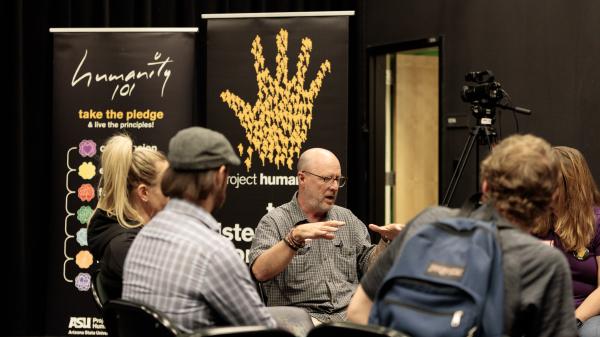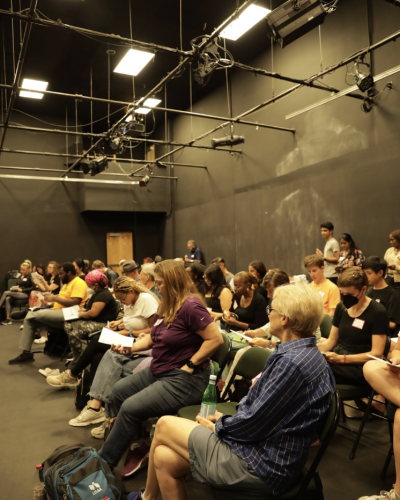The workshops facilitated by Project Humanities at Arizona State University are spaces in which individuals from the community, ranging from ASU students to Tempe residents, are expected to engage in critical conversations regarding the current state of humanity. Such discussion, including but not limited to systematic oppression, exploitation of fellow humans, and the fear of diversity, can be expected to evoke emotional reactions within the participant. However, the workshop Diversity, Fear, and Fairness would instead stir powerful emotions throughout the audience by beginning the workshop by asking them to share a personal story with others.
In the current cultural climate of America, which continues to be defined by the growing rift among its citizens, the media only appears to cover the distance that grows between people. One of the main speakers of the workshop reminded the audience that a way to shorten the distance between two hearts is through a story. To feel the power a story can possess in shortening the distance between people, the workshop facilitators assigned participants a number and asked them to break groups based on their number. Then, participants were presented with two themes—fear and belonging—and given a few minutes to decide what story from their life they wanted to share regarding one of the theme words. One person after the next in the group would share their story without interruption or questions being asked so that those who were listening could practice actively listening. The following stories ranged from having to escape one’s country to avoid torture to being called a racial slur at the age of five. The story circles, as they termed the activity, developed amongst each group was a crucial activity that strengthened this workshop as it allowed the walls society tells us to put up to be broken down and humanize our fellow audience members before we learned some of the stances they held on controversial statements.
The next activity of the workshop was called “Civil Dialogue,” created by scholars from the ASU Hugh Downs School of Human Communication, as an exercise to promote civil and productive dialogue for controversial statements. The other main speaker summarized what was to be expected during the activity and then revealed the controversial statement: “Abandoning commitments to diversity is dangerous.” The phrases offered to describe our position on the statement were Agree Strongly, Agree/Somewhat, Neutral/Undecided, Disagree/Somewhat, and Disagree Strongly. Five audience members then volunteered to sit in front of a phrase aligned with their position on the statement. A dialogue occurred then that provided insight into the variety of perspectives on the statement regarding diversity, from stating if we don’t stay dedicated to commitments to diversity, the racist Southern culture of the United States will spread nationally to questioning what these commitments were in the first place. Although this activity was insightful, I think it was a weakness of the workshop because it didn’t prepare the audience for the realities they will face when they leave the walls of the workshop when conversing with others about controversial topics. Instead, the audience should have received strategies through an exercise or video demonstration on how to navigate discussing controversial statements with less composed individuals.
Many individuals live life performing, whether that be to conform to cultural norms or to compensate for one’s insecurities. The Diversity, Fear & Fairness workshop reminded the audience that before engaging in provocative conversations, it is beneficial to look past their performance and learn more about the person by critically listening or reading the words they are sharing with us. Storytelling, both as the narrator and listener, is important because it can heal cultures by allowing “othered,” whether racially, politically, or religiously, communities to free themselves from living under a suffocating single narrative others assign to them.

